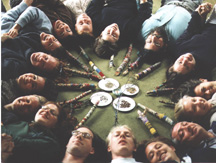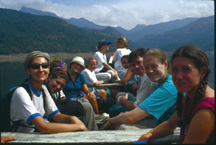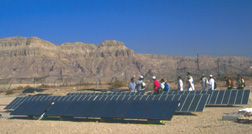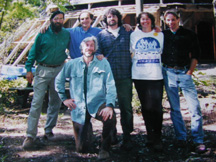|
18-12-2023
-------------------------------------------
Navigation
Previous / Home / Heading / Next
-------------------------------------------
https://www.habiter-autrement.org/ > Eco-village
--------------------------------------
Living Routes - Ecovillage Education
Consortium

Overview
Background
We are living in the most challenging, yet also, in many
ways, the most
promising era of human history. The culture of our industrialized society
appears very much like the Titanic - charging forward with disregard for the
warning signs of climate disruption, overpopulation, over consumption, habitat
loss and social injustice, while we dine below deck, toasting our technological
prowess. It may not yet be too late to change our course. But if we are to keep
our ship afloat, we will need to develop new visions and maps to guide us toward
more peaceful and sustainable lifeways.

Fortunately,
as deep ecologist Joanna Macy has said, we have already begun a "Great
Turning." Ever increasing numbers of people, organizations, and communities
across the globe are evolving new models of education that help develop the
understanding, commitment, and skills we need to build healthy lifestyles and
ecosystems.
There exists today a growing international network of "ecovillages"
- communities that are striving to create cooperative lifestyles in harmony with
their local environments. These ecovillages are refining social and ecological
tools such as consensus decision making, ecological design, community-scale
renewable energy systems, and organic farming that offer positive visions and
alternatives for humanity and the planet. Many of these communities have matured
to the point where they are ready to share their growing wisdom and expertise
with a broader audience. Ecovillages in other countries such as Crystal
Waters (Australia),
Findhorn (Scotland), and Auroville
(India), and in North America such as Sirius
(MA), the EcoVillage
at Ithaca (NY), The
Farm (TN), and Earthhaven
(NC), have already experienced considerable success as educational centers,
often in partnerships with schools of higher learning.
There
is also a growing number of innovative educational programs that are bringing
together the best that academia and sustainable communities have to offer. For
example, the Community Studies Program runs semester programs at Findhorn
through Pacific Lutheran University and Geocommons runs programs to Auroville
through the University of New Hampshire. Other university campuses that are
embracing sustainability in their curricula and operations include Brown,
Cornell, Oberlin, Tufts, and Harvard, to name but a few.
Project Description
The mission of Living Routes is to develop and support a diverse, yet
integrated set of ecovillage-based educational programs that empower
participants to help build a sustainable future. Living Routes is working
closely with the Global Ecovillage Network (www.gaia.org) and a consortium of
ecovillages, academic institutions, and other organizations to create these
globally connected yet regionally developed programs.

At
the core of Living Routes is an expanding
collection of experiential learning programs that support participants to
develop knowledge, skills and values through direct experiences within
sustainable communities. Some programs are semester-long residential experiences
in one or more ecovillages. In these programs, students create their own
"learning communities" within "living communities" as they
help design and build ecological structures, learn effective methods of
decision-making and conflict resolution, research sustainable strategies, grow
and prepare organic food, study and reflect on readings and experiences, support
each other's personal and spiritual growth, and work to enhance the health of
wider communities and ecosystems.
Many of our ecovillage-based programs will be closely integrated with
ongoing, related coursework that students are taking at neighboring colleges.
While some of these programs may not include residence at ecovillage sites, they
will still have many of the same holistic, community-based components of the
residential semesters and will be ideal for long-term research into sustainable
strategies. By linking the developmental priorities of ecovillages and
partnering schools, these programs will help students and their sponsoring
colleges become significant players in developing societal models that help
restore a healthy relationship to our planet and to each other.
Living Routes programs will be connected to a
consortium
of colleges and universities that allow students to participate as part of
their academic career. Some students may take only one program; others may
pursue a sequence of programs leading to a "major" within an academic
institution or to a "certificate of mastery" awarded by Living
Routes. While hands-on learning and community living is a hallmark of these
programs, we hope to augment these experiences through distance learning courses
and through internet linkages among students and ecovillages around the world.
Research, Development and Demonstration
An integral part of Living Routes' vision is to develop a network of
Research, Development, and Demonstration (RD&D) sites focusing on
appropriate technologies and permaculture design (a whole systems approach to
developing sustainable habitats) in the context of sustainable social systems.
Research projects that compare technologies and practices across participating
ecovillages and campuses will provide outstanding educational opportunities for
students, vital input for ecovillage and campus development, and excellent
venues for educating the broader public.

Initially,
the RD&D program will focus on assessing sustainable development in current
ecovillages through "ecological footprinting", carbon indexing, and
other methods that measure our impact on the Earth. It will also assist
ecovillages in developing strategic plans for optimizing their future
development as living and learning centers. Later, students and ecovillages will
participate in the design, implementation, monitoring and comparative analysis
of numerous technologies and practices such as solar greenhouses, passive
refrigeration systems, super efficient stoves and ovens, ecological waste-water
treatment, hydrogen energy systems, solar hot water systems, organic food
production, and watershed restoration. Students will apply this same spirit of
research, experimentation and innovation to the more "social"
technologies such as consensus decision making, voluntary simplicity,
educational models, and conflict resolution. This complementary balance between
social strategies and physical infrastructure will be one of the foundations of
all of Living Routes' educational programs.
Living Routes programs are designed to directly benefit participating
ecovillages and academic institutions. Ecovillages will benefit from program
fees and the carefully coordinated labor and research that dedicated students
and partnering universities bring. Universities will benefit from access to
these high-quality programs that ground their growing interest in sustainability
in an integrated community context. In addition, Living Routes will
provide support via faculty trainings, innovative curriculum models and
materials, and ongoing RD&D projects and will strive to facilitate local
connections among ecovillages, universities, and other like-minded organizations
in order to create regional networks of support.
Over time, Living Routes hopes to support a wide range of programs
focusing on sustainability and help facilitate dialogues and networking among
university faculty, ecovillage participants, etc. Living Routes may also provide a range of support services such as collective marketing
and fundraising, personnel and contracts management, and academic liaisoning, to
programs that are struggling to make it on their own. Finally, Living Routes
hopes to eventually develop programs and curricula for primary and secondary
schools as well as for adult learners.
Living Routes' funding will come from a mix of program development
grants shared with partnering academic institutions, student tuition, foundation
grants, fees for services provided to related programs, and other contributions.
Eventually, we anticipate additional funding from curriculum guides as well as
royalties from products developed through our RD&D activities.
Next Steps
We expect this vision will take decades to fully manifest. What follow are
our priorities for the next two years.
-
Create partnerships with a core group of academic institutions,
ecovillages, and organizations
-
Operate current programs (Findhorn Program, Crystal Waters and North
America)
-
Lay groundwork for new programs at Crystal Waters, Green
Kibbutzim, and
N.A. Ecovillages
-
Initiate the RD&D program at a number of ecovillage and campus sites
-
Help develop local partnerships between ecovillages and neighboring
universities
-
Offer faculty trainings for
Living Routes staff and university
liaisons
Meet the Team

A
strong team has formed to carry this vision forward. These individuals include:
Daniel Greenberg, Ph.D., who has spent five years directing university level
programs in ecovillages around the world; Lawry Gold, who has developed the
Community Studies Program at Findhorn and is an Associate Professor at Pacific
Lutheran University; Jeff Clearwater, who has 20 years of experience in
designing appropriate technology and renewable energy and water systems and is a
board member of the Ecovillage Network of the Americas; Jeff Grossberg, a board
member of the Fellowship for Intentional Community and a consultant in
fundraising and planning for progressive not-for-profit organizations; Elan
Shapiro, the Director of Sustainable Living Associates with 25 years of
experience implementing community and earth-based education programs; Liz Walker, long-time environmental and community organizer and
co-founder and
Director of EcoVillage at Ithaca; Philip Snyder, Ph.D., the program director of
the Global Ecovillage Network, and Will Keepin, Ph.D., co-founder of the Shavano
Institute, a non-profit service training institute.
If you are interested please contact Living Routes.
Together we can ensure a sustainable future!
Living Routes
info(AT)LivingRoutes.org
www.LivingRoutes.org
-------------------------------------------
Navigation
Previous / Home / Heading / Next
   
-------------------------------------------
...https://www.habiter-autrement.org/
> Eco-village
Contact pour HA: lreyam@gmail.com

|